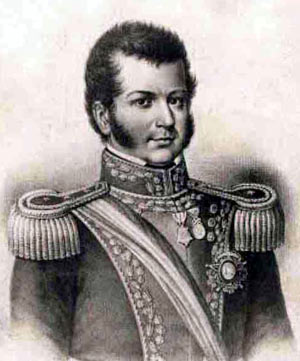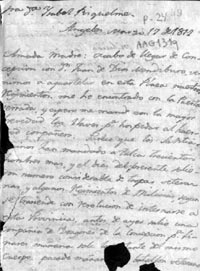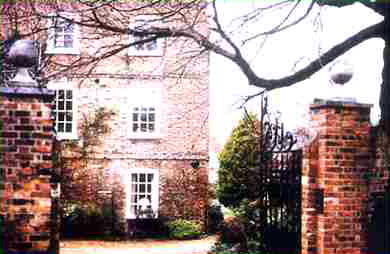|
In the small hours of
9 July 1824,
Bernardo O'Higgins, the man who had ruled newly-independent
Chile with an iron fist, was recovering from malaria in
Trujillo,
Peru.
He had relinquished power. His lifelong second-in-command
Ramón Freire, who had served under him in almost every battle
of the Chilean independence campaign, had banished him. It had
been a bitter argument. The Chileans were on the verge of a
civil war, and O'Higgins ultimately decided that there was no
point in going to a war against Freire, who had become ruler
of the southern province of Concepción.
Although it was not what he wanted, in January of 1823
O'Higgins surrendered power. It was a heated meeting with the
Santiago leaders. Knives and swords were concealed among the
audience, yet when Bernardo resigned, the small crowd roared
in approval and saluted the brave men who had led the
independence process.
O'Higgins now found himself in
Trujillo,
Peru, experiencing a second exile. From Chile he had planned
on travelling to Ireland, the land of his father Ambrose, a
Sligo-born and Meath-raised man who at the age of thirty had
gone to Spain, worked in commerce, travelled thence to South
America, joined the Spanish Army in Chile and ended his
eighty-year-old life as Viceroy of Peru. Shortly after leaving
the Chilean
port of
Valparaíso,
O'Higgins changed his mind. He disembarked in
Callao,
the main Peruvian port, and stayed in that country with his
family: his mother, his half-sister and his two children, a
boy and a girl.
He was not a stranger in that country. Along with the
Argentine general José de San Martín, O'Higgins had set up a
naval force that sailed from
Chile
and defeated the Spaniards in Peru. He was welcomed, given
property and a military title. However, the Spanish forces had
re-taken Lima, and soon O'Higgins and his family were forced
to flee northwards.
In
Trujillo
one day ran into another until O'Higgins received a letter. It
was a warm-hearted message from Simon Bolívar, the leader of
the South American independence process. He was seeking
Chilean support, in the hope that O'Higgins few remaining
friends in Chile might be interested in helping him to
re-conquer
Peru.
'A brave general like yourself,' wrote Bolívar, 'feared by
enemies and experienced among our officers and leaders, cannot
do anything more than give a new degree of appreciation to our
army […] I offer you command […] appropriate to the
distinction of any leader who wants to distinguish himself in
the battlefield, a Colombian regiment under your orders must
achieve victory.' (Valencia, 1980:
420) [1]
Still suffering the after-effects of his bout of malaria,
O'Higgins gained a new lease on life. All of a sudden, the
excitement of the battle was upon him once again. Respected by
friends and foes alike in battle for his bravery almost to the
point of insanity, O'Higgins did not excel in many other
fields. He was not a gifted politician, nor was he a member of
the colonial aristocracy who ruled the central valley of
Chile
and controlled Chilean politics. O'Higgins had not married,
but briefly kept a lover who gave him a son and then left him.
He lived with his mother and sister. Neither was he a
brilliant strategist. 'General O'Higgins was brave to the
extreme,' wrote José de San Martín, one of his closest
friends, many years later. 'But his military knowledge was
nil.' (Ruiz, 2005: 228)
[2] In battle, he stopped being Bernardo and became General
O'Higgins, a man who fought side by side with officers and
peasant-soldiers alike, who was shot and almost died, who had
undertaken the incredible crossing of the Andes from
neighbouring Mendoza into central Chile.
From
Trujillo,
O'Higgins departed in search of Bolívar's army, somewhere in
the Peruvian Andes. The journey took him an entire month,
during which the sick man crossed scorching deserts and high
mountains on a trip that seemed to have no end. His ambition
was to once again engage in battle against the detested 'godos'
or 'sarracens' which was the derogatory title that the
American independence fighters bestowed upon their foes-. When
O'Higgins finally located Bolívar's army, he found that he had
no place in it. Stunned, Bolívar gave O'Higgins the highest
formal honours, but delegated to him only menial jobs. The General
ended up as the special court-martial judge for Chilean
volunteers. The rainy season was approaching and Bolívar did
not plan on attacking the royalists. He suggested that
O'Higgins return to Lima, which had by then been reconquered
by the patriots. In the Peruvian capital O'Higgins learned of
the battle of Ayacucho and the confirmation of Peru's
independence. General O'Higgins was cordially invited to a
celebratory banquet in Lima a few weeks later. He went as a
civilian and declared that his days as a soldier were over. 'Seńor,'
he toasted, addressing Bolívar, “America
is free. From now on General O'Higgins does not exist; I am
only Bernardo O'Higgins, a private citizen. After Ayacucho, my
American mission is over.' (Valencia, 1980: 430)
[3]
From
Chillán to
Europe
Bernardo O'Higgins was born on
20 August
1778, in Chillán, a small village in southern Chile. His
father, Ambrose Higgins, a Sligo-born 58-year-old military
factotum in the service of the Spanish crown, was the most
powerful man in what was known as 'the Frontier,' the region
around the Bio-Bio river in southern Chile, no-man's land
claimed by both the Spanish and the Mapuche. Though formally
Ambrose's position was strictly military, by 1778 he had
achieved renown in the eyes of the Spanish civilian
authorities by defeating indigenous rebellions, and had been
given carte blanche to operate in the region.
The previous summer, Ambrose O'Higgins had briefly camped on
the estate of Simón Riquelme, a quiet, faint-hearted man who
owned some land near Chillán. There he met and briefly courted
Isabel, Simón's eighteen-year-old daughter. Soon Isabel was
pregnant. It is possible that Ambrose had given Simón a
promise to marry his daughter. The reason for a delay in the
engagement was that as a European officer O'Higgins had to ask
permission to marry a local woman.
Ambrose never fulfilled his promise; there are no records of
the marriage, and he was soon thereafter to be found south of
the border in a military campaign. He never saw Isabel again.
Nor did he see his son. Isabel was hidden from public view,
and the baby given to a local matron. Isabel was married
shortly afterwards to an old friend of her father who died two
years later. From that marriage a girl was born,
Rosa.
The presence of the illegitimate child haunted Ambrose
O'Higgins at first and later became an obsession. He soon took
the baby away from Chillán and the Riquelmes, and put him in
the care of a friend in
Talca, some
250 km north of Chillán. Later the young Bernardo was sent
back to Chillán, to a school run by the Franciscans for the
Mapuche aristocracy. The monarchism of the priests in Chillán
was in opposition to new ideas born of the French revolution,
which, even in this remote part of the world, were beginning
to wield influence. In Chillán Bernardo briefly saw his mother
again, but was soon moved on again by his father, this time to
Lima,
the viceregal capital, where the young Chilean was educated at
the best schools available. At one school, the Convictorio
Carolino, Bernardo probably first heard the ideas of the
European enlightenment: one of the priests, Toribio Rodríguez
de Mendoza, was a remarkable enlightenment man, who believed
in the power of mathematics and in the notion that he and his
students were more Peruvian than Spanish. But yet again
Bernardo had to leave, this time for a pressing reason.
Ambrose had been nominated Viceroy of Peru, and an
illegitimate son was not good for his reputation.
Young
Bernardo then left for Europe. It remains a mystery whether
Ambrose intended to place his son in the army, in a commercial
company or to make him engage in further studies. At first he
lived briefly in Cádiz, in the care of Ambrose's friend and
former business partner Nicolás de la Cruz, a Chilean-born and
extremely wealthy merchant. Then Bernardo moved or was moved
to London for reasons unknown. We know for certain that he
lived in Richmond-upon-Thames, in the 'care' of Spencer and
Perkins, two watchmakers who may have had an entrepreneurial
connection with De la Cruz. Only a handful of documents have
survived from this period of Bernardo's life. We know that in
the last months of his London life, he attended and possibly
lived at a private Catholic academy in Richmond run by a
Timothy Eeles or Eales. Tradition has it that Bernardo courted
Mr. Eales' daughter Charlotte, but the relationship ended
abruptly. His last months in England were chaotic. Probably
because of financial problems, or Bernardo's hectic social
life, the watchmakers stopped supporting him and kept De la
Cruz' money to pay off his debts. O'Higgins was left penniless
and had to live with friends. |




